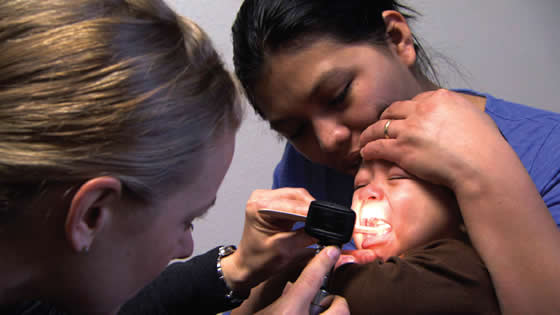 ESCAPE FIRE: The Fight to Rescue American Healthcare tackles one of the most pressing issues of our time: how can Americans save their badly broken healthcare system?
ESCAPE FIRE: The Fight to Rescue American Healthcare tackles one of the most pressing issues of our time: how can Americans save their badly broken healthcare system?
American healthcare costs are rising so rapidly that they could reach $4.2 trillion annually, roughly 20% of their gross domestic product, within ten years. Americans spend $300 billion a year on pharmaceutical drugs – almost as much as the rest of the world combined.
ESCAPE FIRE also presents attainable solutions. After decades of resistance, a movement to bring innovative high-touch, low-cost methods of prevention and healing into our high-tech, costly system is finally gaining ground. Filmmakers Matthew Heineman and Susan Froemke interweave dramatic personal arcs of patients and physicians with the stories of leaders battling to transform healthcare at the highest levels of medicine, industry, government, and even the U.S. military. ESCAPE FIRE is about finding a way out of our current crisis. It’s about saving the health of a nation.
Bijan Tehrani: As a film director, you deal with important social issues in most of your films. What sparked your interest in these kinds of topics?
Matthew Heineman: I care deeply about relevant social issues and they are important to address. Healthcare is one of the most important issues effecting America today, and I started making this film three years ago. Like many Americans, I was confused by what was happening and wanted to get to the heart of this matter: how and why our system is so broken, and why it didn’t want to change. I tried to highlight some people that were trying to fix it. 
BT: It’s evident that you conducted a great deal of research and you have a firm grasp on your material. Tell us about that part of the work?
MH: Before we even turned on the cameras, we spent about six to eight months researching the topic to really understand it and try to figure out how to focus on it. We wanted to figure out how we were going to tell the story and make sure that we were focusing on different storylines that would show the healthcare issue through a different lens. We wanted to make sure that we did not have a talking head film and that we had powerful human stories.
BT: ESCAPE FIRE has a very exciting rhythm and captivating imagery. How did you come up with the visual style?
MH: Visual style is incredibly important to me as a filmmaker. We knew that this topic had the potential to be boring, so visually we wanted to make sure that we told this story in a very exciting way. We wanted to find stories that would move you and illicit emotions, and even highlight what is wrong in our system and cause some change as well.
BT: Your film does not take sides with one group or another; you are trying to investigate the root of the matter. How challenging was it be objective in your filmmaking?
MH: It was really challenging! This issue is so highly polarizing, so highly political and highly partisan, it has really divided our country. The Tea Party movement grew out of the health care debate, and we did not want to play into that. We wanted to try to transcend partisan politics and really view the film as agnostic when it comes to politics. To really affect change, you need to bring all sides to the table, so we knew from day one that we did not want to make a partisan film.
 BT: I think this is a film that Washington should see. Have you had any members of congress see this film?
BT: I think this is a film that Washington should see. Have you had any members of congress see this film?
MH: We have a few screenings in the works, but I think because of the election most of the screenings will happen after November. Next week we are actually having a screening at the pentagon and the Surgeon General of the US army will be there. We will also be screening at 15 festivals across the country and we hope to reach young, idealistic doctors.
BT: How much do you think ESCAPE FIRE will help with those who really want a solution for the healthcare issue?
MH: I hope it helps tremendously. I hope it forces our country to really look in the mirror and ask what kind of healthcare system that we want in the future. That changes needs to happen at all levels—not just the head of a pharmaceutical company, not just the head of an insurance company, not just different organizations. To really change the system, change has to happen at all levels. We need to see that we all play an important role in our system, and we hope that we can help people to take better care of their health.
BT: This is your second film with a co-director. How do you deal with co-directing the film with someone else?
MH: I think co-directing is a wonderful thing! It has been a wonderful experience working with Susan on this film, and we compliment each other very well. We see eye–to-eye on almost everything, and where we don’t see eye-to-eye actually makes the project better—especially in the edit room where there are so many decisions made all the time. I enjoy the ability to share back-and-forth discussions about where we should go, and eventually the idea is better than either of us could have done on our own.
BT: What is the next project that you are working on?
MH: I am dedicated to working on this film for the next couple of months, and hopefully we can help people see the film and take action. I really want to make sure that this film gets out for the masses to see it. I have a lot of other ideas, but I have not yet begun work on them as of yet.
BT: Fantastic job on this very important film, and best of luck to you!
ESCAPE FIRE is on LA screens at AMC Loews Broadway 4 in Santa Monica and Laemmle’s Playhouse 7 in Pasadena. ESCAPE FIRE is also available on VOD.

